|
|
|
Sort Order |
|
|
|
Items / Page
|
|
|
|
|
|
|
| Srl | Item |
| 1 |
ID:
165204
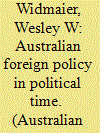

|
|
|
|
|
| Summary/Abstract |
Over the past century, Australian foreign policy orders have been stabilised by the construction of ideas that have reduced uncertainty regarding national interests. Yet, such ideas have often evolved in ways that have engendered misplaced certainty, renewed instability, and crisis. To explain such shifts, I highlight the role of an Australian ‘pragmatic liberal tradition’, one which has enabled alternating tendencies to principled stability or technocratic hubris. In a tripartite model, I trace stages over initial ‘middle power’ efforts to construct ideas that lead states—and particularly great powers—to identify interests in cooperation, misplaced certainty in great power ties which obscures new challenges, and the construction of crises that impede or enable change. Empirically, I apply this framework to the construction, conversion, and crises of the ongoing ‘Reform order’. These span the initial Hawke-era middle power integration of US and regional ties, Howard-era misplaced certainty in US-styled neoconservative bandwagoning and neoliberal macroeconomic accommodation, and evolving constructions of the War on Terror and Global Financial Crisis. In the conclusion, I address theoretical and policy implications, highlighting the initial challenges that crises can pose for middle power leadership, and the subsequent scope for creativity.
|
|
|
|
|
|
|
|
|
|
|
|
|
|
|
|
| 2 |
ID:
079946
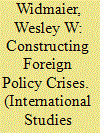

|
|
|
|
|
| Publication |
2007.
|
| Summary/Abstract |
Over the past century, crises have often driven shifts in U.S. foreign policy, as a liberal tradition has been permissive of varying tendencies to isolationism, pragmatism, or a crusading internationalism. While materialist analyses emphasize the impacts of crises on the capabilities of state and societal agents, they obscure the role of agents in interpreting crises. In this paper, I therefore offer a constructivist analysis, stressing the role of presidential rhetoric in the construction of crises as events which legitimate shifts between variants of the American liberal tradition and definitions of the national interest. I specifically examine interpretations of the Cold War and War on Terror offered in the March 1947 Truman Doctrine speech and September 2001 Bush Doctrine speech. Truman and Bush each reinterpreted international challenges as pertaining to "ways of life," transforming security and partisan debates in ways that delegitimated isolationism. In sum, this analysis highlights the enduring traditions and mass understandings which can themselves constrain elite debates.
|
|
|
|
|
|
|
|
|
|
|
|
|
|
|
|
| 3 |
ID:
066283
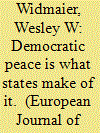

|
|
|
| 4 |
ID:
114085
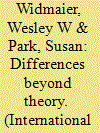

|
|
|
|
|
| Publication |
2012.
|
| Summary/Abstract |
Over the past two decades, one of the main themes in IR theory debates has been a concern for the interplay of agents, structures, and change. In this article, we engage with these debates as they pertain to "the state of the art" by highlighting in broad fashion three "constructivist turns" and their implications for efforts to explain the rise and demise of norms. More specifically, we offer a stylized history of a debate marked by shifting emphases on structural constraints, strategic practices, and sentimental forces. In the context of this symposium, while we accept many of our colleagues' critiques of extant scholarship, we draw on the work of Richard Rorty to argue that the most important differences pertain to matters "beyond theory," regarding the effects of norms in enabling the establishment of either an open community or disciplinary society.
|
|
|
|
|
|
|
|
|
|
|
|
|
|
|
|
| 5 |
ID:
079944
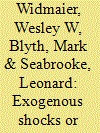

|
|
|
|
|
| Publication |
2007.
|
| Summary/Abstract |
This symposium addresses the role of wars and crises as mechanisms of international change. Over the past two decades, the international system has undergone a number of remarkable transformations, from the end of the Cold War to the emergence of an ongoing "War on Terror," and from the collapse of statist development models to the emergence of a contested-if evolving-neoliberal "Washington Consensus." This volatility exceeds any underlying shifts in economic structures or the distribution of capabilities, and raises important questions regarding the roles of agency, uncertainty, and ideas in advancing change. In this introduction we examine the role of wars and economic crises as socially constructed openings for change. We attempt three things: to critique materialist approaches in the security and political economy issue areas, to outline the distinctive contribution that an agent-centered constructivist understanding of such events offers, and to offer a framework for the study of such events, one which highlights an expanded range of elite-mass interactions.
|
|
|
|
|
|
|
|
|
|
|
|
|
|
|
|
| 6 |
ID:
052406


|
|
|
|
|
| Publication |
June 2004.
|
| Summary/Abstract |
Over the postwar period, states have shifted from cooperation in support of monetary guidelines, or standards for variation in wages, prices, and exchange rates, to the use of austerity as the primary means of maintaining monetary stability. In this article I offer a constructivist theory of international monetary relations in order to explain this shift, contrasting the effects of Keynesian and Neoclassical understandings on interests in cooperation. I argue that postwar Keynesian understandings, which cast monetary power as based in the authority to stabilize expectations, led states to perceive common interests in maintaining decentralized-but-legitimate guidelines. I then argue that more recent Neoclassical views, which cast monetary power as a function of capabilities, have justified reduced mutual assistance and greater recourse to austerity. From this vantage point, Neoclassical understandings, rather than any material constraints, impede the cooperation necessary to reconcile the impossible trinity of capital mobility, full employment, and monetary stability.
|
|
|
|
|
|
|
|
|
|
|
|
|
|
|
|
| 7 |
ID:
072483
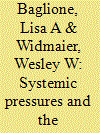

|
|
|
|
|
| Publication |
2006.
|
| Summary/Abstract |
Over the economic crises of the 1990s, global economic understandings shifted from the early classical orthodoxy of the 'Washington Consensus' to a later Keynesian support for demand stimulus and capital controls. However, Russian policy - particularly after the 1998 ruble crisis - partly deviated from these broader trends, combining Keynesian capital controls with classical budgetary restraint. In offering a 'constructivist-institutionalist' explanation for this policy mix, we assume that agents can always interpret or construct events as varying types of crises, reshaping state society relations in the process. We then argue that classical interpretations of the early 1990s' crises legitimated orthodox policies and more importantly - alienated the Russian state from society. Given this backdrop, while later interpretations of the 1998 ruble crisis legitimated capital controls, the prior alienation of state from society precluded any domestic Keynesian coalition. Global pressures must, from this vantage point, be situated in specific social and institutional contexts.
|
|
|
|
|
|
|
|
|
|
|
|
|
|
|
|
| 8 |
ID:
058472


|
|
|
|
|
|
|
|